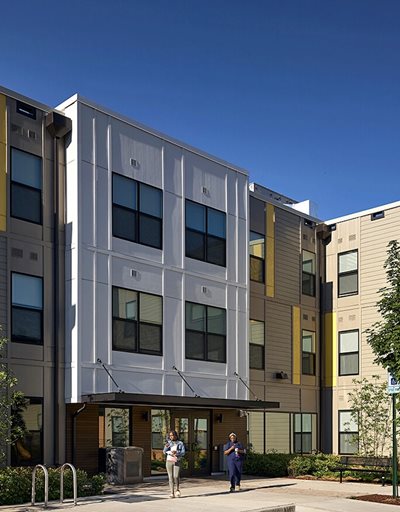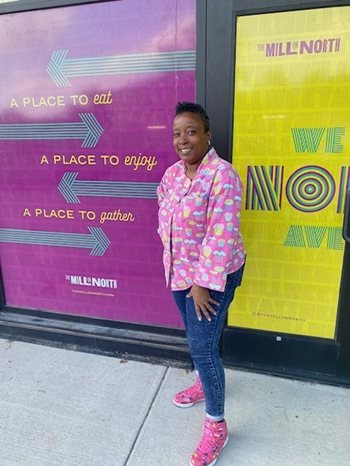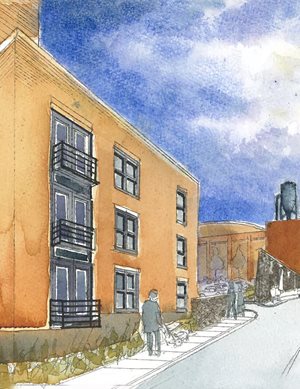For decades, residents in West Baltimore have had to travel if they wanted to sit down to a restaurant dinner with their families. "Those of us with cars could go somewhere else," recalls Jacqueline Caldwell, who grew up in the area. "But if you didn't have transportation, there was nothing besides the Chicken Box on the corner."
The new Mill on North Food Hall, set to be completed this summer, will change that.
"I'm excited for it to be done," says Dan Ellis, executive director of Neighborhood Housing Services (NHS) of Baltimore. Ellis' organization worked with partners to build the food hall on the ground floor of an apartment complex. The upper part had been constructed using low-income tax credits.
The food hall will be on North Avenue, not far from Coppin State, a historically Black university. The space began as a lumber mill, which NHS of Baltimore and its partners – Coppin Heights CDC and Osprey Property Company – purchased and cleaned up, turning it into 65 apartment homes. From the beginning, they had hoped to reserve the ground floor for something that would make the neighborhood better.
"If you think of the street in your town that's the worst, well, that's North Avenue," says Ellis. "We knew that was the part of town where we needed to make these improvements."
Before construction began.
Retail and restaurants are not what his organization normally does, but that didn't stop them. The first business they approached was a bank, a chance to offer residents an alternative to the check-cashing services they usually used.
"We don't use the term ‘banking desert,' but if we did, this area would qualify," Ellis says. Once the bank opened, they had an additional 7,500 square feet to work with. "We asked the community what they wanted, and they said, 'We want a place we can have dinner with family and friends. And we don't want to have to get a car or find transportation to get there.' That really resonated with me."
Connecting with local entrepreneurs
The goal then became bringing in entrepreneurs from the community. Ellis says he wanted to remove

The food hall will go in the ground floor of the complex.
some of the barriers that would keep entrepreneurs from opening a business, and a food hall, with a lower overhead for restaurants, seemed like the way to go. That way, NHS and its partners could take on more of the infrastructure responsibility and initial cost burden. They settled on six restaurant stalls and a cocktail bar.
"As we got into the project, we found we could really work with local vendors, with people who have a connection to West Baltimore," Ellis says. "Every one of our vendors grew up there or had a business there historically. We didn't want to bring in chains or outside groups."
Ellis' hope is that more businesses will be drawn to the area as it becomes more vibrant. But first, the food hall has to work. Vendors will serve soul food, Southern food, deli sandwiches, stuffed potatoes and more.
Caldwell, past chairman of NHS' board, sampled some of the food when vendors celebrated with them during the groundbreaking. "It will be a gathering place for the community," she says. "And their food is really good."
Food halls are similar to food courts in some ways, but they are not built around retail; instead, they are destinations in themselves.
"A place that people want to go and gather," Ellis agrees. "All of the businesses opening in the food hall will be Black-owned, and most are women-owned. It's all about creating opportunities and resources that will stay in the neighborhood. Economic development is not about building something and then having people spend money. It's about building and having people spend money and it stays in the community – it grows the economy of West Baltimore."
April Richardson, consultant on the project, has worked on food halls before and helped open the first Black-owned food hall in the United States in Prince George's County. She says she wanted to be sure that people of color had the same food opportunities that everyone else did. "As a kid growing up there, we had within walking distance five liquor stores and five carry-outs that all sold the same thing. There was no food diversity. No one would come into the community because they didn't believe we had the income to pay for better food. They didn't believe we desired better food." As soon as she signed on to the project, she started reaching out to vendors.

Andiedra Bell-Bunch, better known as Chef Dee.
One of those vendors was Andiedra Bell-Bunch, better known as "Chef Dee." Bell-Bunch is the owner of Cupsey Cakesy, a pastry business she started after years of cooking with her grandmother and mother –and some of her recipes come from them. While building her business, she also received an Advanced Culinary Arts degree.
Bell-Bunch signed onto the project at the beginning. Her business is now mostly online, and she's looking forward to having a stall, which will be right in the middle of the food hall. "When you come in, you'll be able to smell those baked goods."

When you come in, Andiedra Bell-Bunch says, you'll smell baked goods like these.
The chef grew up about five minutes from where the food hall is located and is excited to bring different options to the area. "It's a food desert," she says. "If you look at our area, you'll see liquor stores, churches and carry-outs. We'll now have healthier, better options." Though she serves sweets, they include vegan and sugar-free options. "This is going to be a good look for the neighborhood. They're really building it up. I think it will be a good look for West Baltimore."
Following through on a vision
There are few food halls in low-income communities, Ellis says. And so there are people, especially outside the community, who think the food hall might fail. "But those who think it won't work are not from the neighborhood. A hundred thousand people live there and they eat. The community has said they will be there … [The food hall] will be good for the city and good for West Baltimore and good for the community. That's what we care most about."

Rendering of the neighborhood.
NeighborWorks America cares, too. "NeighborWorks continues to support our network efforts to build Black wealth and assets in the communities they serve," says Ramona Johnson, a member of NeighborWorks' Black Wealth and Asset Building Group. The group, which includes both NeighborWorks America staff and network members, focuses on Black wealth and asset building as part of an ecosystem to advance wealth in Black communities. "The Mill is an excellent example of how Black wealth can be created through economic empowerment."
While NeighborWorks doesn't have any funding directly in the project, Ellis says the national nonprofit has been helpful and inspirational. "I didn't even know we could do economic development until I was on a bus tour in St. Louis," he says. As he toured some of the work supported by Beyond Housing, a St. Louis-based member of the NeighborWorks network, he learned from fellow executive director Chris Krehmeyer that the organization had brought in a bank, a grocery store and a movie theater with limited staff.
"That," he says, "told me it was doable. The things we learn from each other show us how to move forward in a positive, healthy way."

